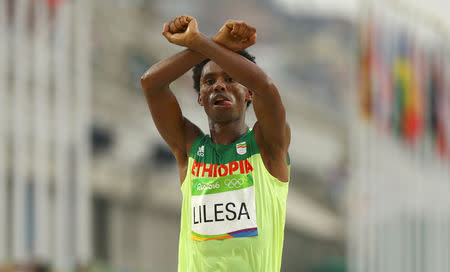Exiled Ethiopian Olympic runner who protested against government returns home
By Aaron Maasho
ADDIS ABABA (Reuters) - A medal winning Ethiopian Olympic runner, living in exile in the United States since making a protest gesture against government violence at the 2016 games, returned home on Sunday following a series of reforms in the East African nation.
Feyisa Lilesa held his arms over his head, wrists crossed, as he finished second in the marathon in the Rio de Janeiro Olympics, a gesture used by protesters in Ethiopia's Oromiya region during a period of unrest in 2015-2017.
On Sunday, Foreign Minister Workneh Gebeyehu received Feyisa at Addis Ababa's airport, where relatives - clad in traditional attire from the Oromiya region - and fans had also gathered.
"I knew this day was coming because I know the blood spilled by all these people was not going be in vain," he told Reuters upon arrival.
The unrest was originally triggered by protests over government's development plan for the capital Addis Ababa, which critics said would lead to expropriation of farmland in the surrounding Oromiya region.
Hundreds were subsequently killed by security forces as the demonstrations evolved into rallies against perceived political and economic marginalisation of ethnic Oromos.
In April, the EPRDF coalition which has ruled the country since 1991, appointed Abiy Ahmed - a 42-year old ethnic Oromo - as prime minister.
"I knew the dictatorship would eventually fall down," Feyisa said. "I was expecting this day but I did not know if it would be today or tomorrow but it has been clear in my mind that I would go back to my father's land alive."
As well as making peace with neighbour Eritrea, Abiy has pursued a reconciliation strategy, extending an olive branch to dissidents and rebel groups, although the changes have not stopped bouts of ethnically-charged violence.After Rio, 28-year old Feyisa competed in a number of marathons, winning some. He told Reuters he planned to focus on training for his sport.
"I can still bring good results for my country in my field," he said. "I was loved by my people because I am a sportsman not because I am a politician. I only brought their suffering to global attention by using my profession."
(Additional reporting by Kumera Gemechu; Editing by Kirsten Donovan)


